
For the last two years, Ripple has been a semi-formal gathering of like-minded people who came together for a common goal. To use our voices to educate, inform and inspire new leaders in our community. To bring new and innovative ideas to the recovery processes for the benefit of all. Our pursuit of becoming a 501(c)(3) nonprofit organization was extremely premature. For a short time, the future of Ripple seemed very unclear. One of our co-founders moved out of the state of Connecticut and the other left Ripple for personal reasons. With the absence of our two most active members, things started to slow down for us, and 2018 was a very uneventful year. We are proud to announce that we will officially relaunch on May 1st, 2019 as we celebrate Mental Health Awareness Month. We will also be unveiling the completed rockingrecovery.org website.
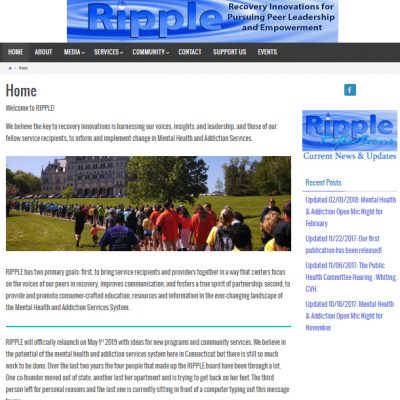
So far the 2019 year has begun with legislative advocacy and continuing education for members of Ripple. If you would like to become a part of the Ripple team and make a difference in our community, we would like to talk to you. We are an all-volunteer group of folks who are coming together to serve our community while supporting each other. We hope that as we grow, we will be able to provide more programs and services to all of our peers and educate the public on mental health and addiction. For more information on Ripple or to contact us, please visit our website rockingrecovery.org.


Community: Crisis Cards: Available to anyone for the price of a self- addressed stamped envelope is our Crisis Card. This is a laminated wallet card that includes the information you could easily give a stranger when you are in crisis and are having difficulty communicating (as in a panic or asthma attack). The stranger would immediately have your name, what condition you are dealing with, what you want them to do (and what you want them NOT to do).
You can add an emergency contact number and any other information you would need or want to communicate in a crisis. The idea for this card came from a peer in recovery, inspired by his story of having a panic attack and being unable to communicate to first responders. Not being able to explain a symptom or condition can be extremely frustrating. If that has ever happened to you, we would like to help. Fill out the online form and simply send to Ripple. The information will be kept only on a flash drive and under lock and key. Your information will be kept physically onsite and will never be available via the internet. Order yours today!
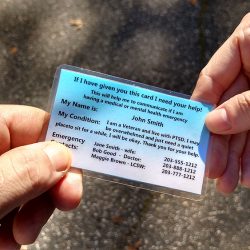
Page 1
News & Advocacy: On March 1st and March 5th we testified alongside members of the Keep The Promise coalition (KTP) at the Legislative Office Building in Hartford. March 5th was particularly important as we addressed several bills including HB 5270. An Act Concerning Peer Support Specialists and Requiring Health Insurance Coverage for Outpatient Peer Support Services Provided By Certified Peer Support Specialists. This was part of Ripple’s submitted testimony:

In October of 2012, the World Health Organization called depression a global crisis. On average we lose 16 veterans and 4 active-duty personnel/reservists a day. In a March 2018 article USA Today reported the suicide rate for children and teens between the ages of 10 and 17 was up an average of 73 percent from 2006 to 2016. USA Today also reported in April of 2018 that more officers and firefighters died of suicide than line-of-duty deaths in 2017.
It is impossible for us to predict when a mental health crisis will occur or who will have one. No one is immune and mental illness does not discriminate. On February 23, 2019, the Middletown Press reported that a state social worker with nearly 19 years of service died by suicide on the Connecticut Valley Hospital campus. Not only was this woman surrounded by mental health professionals she was one herself. I can’t explain why she did not reach out and try to talk to someone she trusted. All I can tell you is that in my experience mental health is fluid and can change from one day to the next.
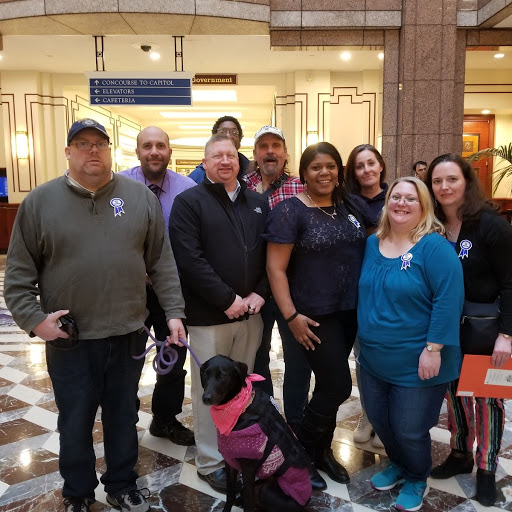
During my recovery, I have worked with Psychiatrists, Psychologists, Licensed Clinical Social Workers, and many other psychiatric professionals. While it is true traditional treatment providers gave me the foundation to begin rebuilding my life; it was my peers in recovery that help me put all the pieces back together. I am living proof that peer support is an effective part of a person’s treatment plan, and the federal Substance Abuse and Mental Health Services Administration (SAMHSA) agrees.
March 1st, 2019, Jeffrey Santo of Ripple and a group from folks from Reliance Health who testified before the Appropriations Committee asking that no more cuts be made to the DMHAS budget.


Ripple Projects: Prison and Community Transition or PaCT Program: We are teaming up with other Recovery Support Specialists with the hopes of creating a program that will benefit peers living with mental illness and addiction who are currently incarcerated. A proposal is currently being drafted, and it will be presented to both the Department of Mental Health and Addiction Services as well as the Department of Corrections in the state of Connecticut.
The Proposal which consists of a three-pronged approach, our first goal is to create an educational program where certified Recovery Support Specialists would facilitate support groups for inmates still inside the prison environment. The second part and most important would be to create a peer mentor program within the prison itself. The third phase of this program would be to provide information and resources for those who are about to be discharged to the community. Recidivism is a huge problem in our jails. Some inmates come and go as if walking through a revolving door. This program will provide an information packet outlining all of the resources within the region of the state they are about to call home once again. Since all of these packets would be free of charge, a yearly fundraiser would need to be organised.
Most of the legwork is already done since the information is already gathered and available through the DMHAS system. The idea is to get it to people who need access to services and may not know what is immediately available in the community. Each packet can be tailored to the specific inmate as well, using simple background information we can connect them to resources they are most likely to need.
Page 2
It will contain information on mental health treatment providers, addiction counseling services, employment services, benefits specialists, housing assistance, food resources, and pantries, as well as information on their local catchment area councils. We believe that when the proper resources are provided a person is much less likely to become a repeat offender. In the mental health recovery community, we understand the impact that trauma can have on a person’s life and well being. Some inmates in Connecticut facilities are not yet guilty of any crime and are considered pre-trial. The person may be unable to afford his bond, or the court did not grant one. Confinement, isolation, and imprisonment are all known to cause psychological trauma, yet our citizens can experience this environment because they lack the financial resources to gain their freedom.

The first two inmate letters sent, the first of many to come. Like so many others it is important to remind them that they are not alone and they still have value in this world.
Even though this program is not finalized in any way, Ripple has already begun communicating with inmates at the Garner Correctional Institution. Supporting someone during their incarceration and at the time of the release is key to preventing a person from spending too much of their life behind bars. This also benefits the community monetarily with so much being cut from our state’s mental health budget every dollar counts. Every person we can keep out of prison saves our state $137 per day or $50,252 a year. Can you imagine the programs we could create and maintain for the rest of the community if we could save that money? We can.

May is Mental Health Awareness Month: This year marks the 70th anniversary of Mental Health Awareness Month since it was started back in 1949 by Mental Health America (MHA). According to their website, MHA and their Affiliates across the country have led the observance of mental health awareness munch reaching millions of people through media, local events, and screenings. For more information, please visit their website at www.mentalhealthamerica.net.
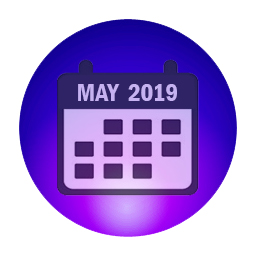

A lot has changed over the last 70 years some things have gotten better, some things not so much. For those of you who are active in the community, you are probably aware by now that we as a state are saying goodbye to the five Regional Mental Health boards that have served our communities for over 40 years. The Department of Mental Health and Addiction Services has reorganized these resources to form the Regional Behavioral Health Action Organizations (RBHAOs). Recently a legal question has been raised as to whether or not this move was allowed by law.

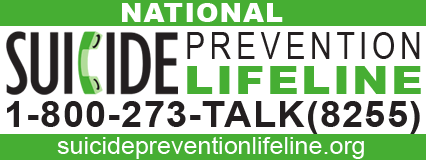

Page 3

Along with celebrating the 70th anniversary of Mental Health Awareness Month here in Connecticut, we are also celebrating the 20th anniversary of the Keep The Promise Coalition (KTP).
KTP is perhaps one of the best advocacy groups in the state, and it shows when everyone appears at the Legislative Office Building. KTP members to offer their testimony, thoughts and share their lived experience as it relates to current issues being voted on by Connecticut representatives and senators. Ripple members have learned first hand (literally) about all the things KTP has to offer. We have attended the Essentials of Legislative Advocacy and Legislative Leadership classes. This training will help you streamline your testimony, reach out to your legislative representatives, and create meaningful connections with other peer advocates.
In their own words: “The Keep the Promise Coalition (KTP) has a vision of a Connecticut in which people with mental health conditions are able to live successfully in the community. They have access to housing and other community-based supports and services that are recovery-oriented, person-driven, and holistic in their approach to wellness.”
For more information, please visit their website at www.ctkeepthepromise.org
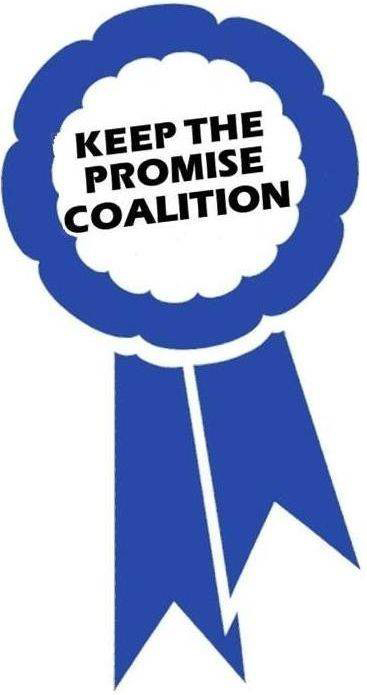

Ripple’s first-ever publication was Power of the Peer in late 2017; it is, in fact, our only publication. When it debuted, it had a retail price of $15 and a discount price of $10 for all peers living with mental illness or addiction. As part of our Mental Health Awareness Month observance, we are setting a retail price of only $10. A limited quantity of these books are available at this price.
We are currently clearing out all of the first printings and making way for a slightly updated 2nd edition. If you are interested in adding this book to your library collection, please contact us at www.rockingrecovery.org
We are planning on releasing several new books between 2019 – 2020. The second book from Ripple will talk about mental health and incarceration; the working title is BROKEN: On The Inside.
The third offering will cover self-care for the peer caregiver; the working title is currently The Peer Support Specialist Survival Guide.
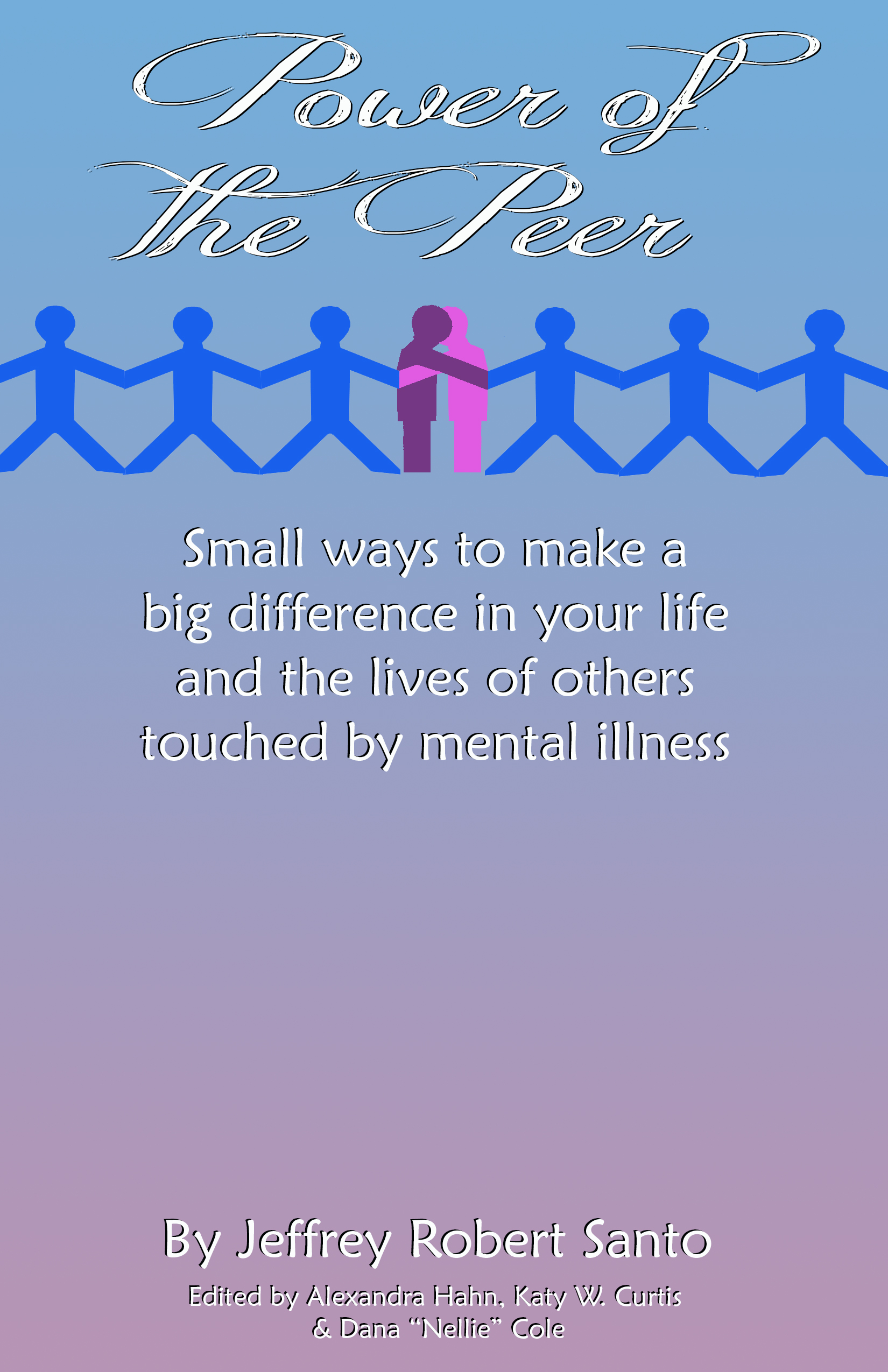
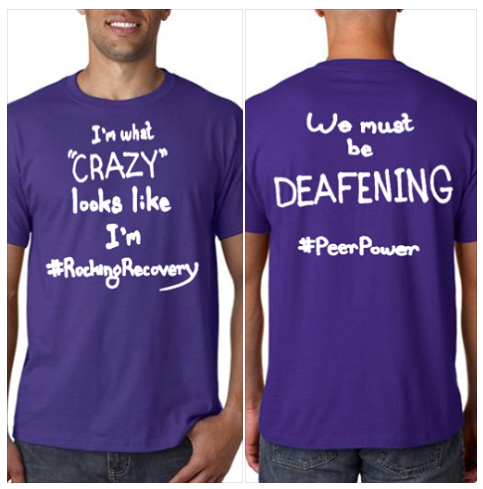
You may remember Ripple’s “purple shirts” that have been seen on and off at local events over the last couple of years. We are planning on creating new ones in the future with a different message on the back. The “We must be DEAFENING” book project is unfortunately on hold as the creator of this endeavor is no longer with us.
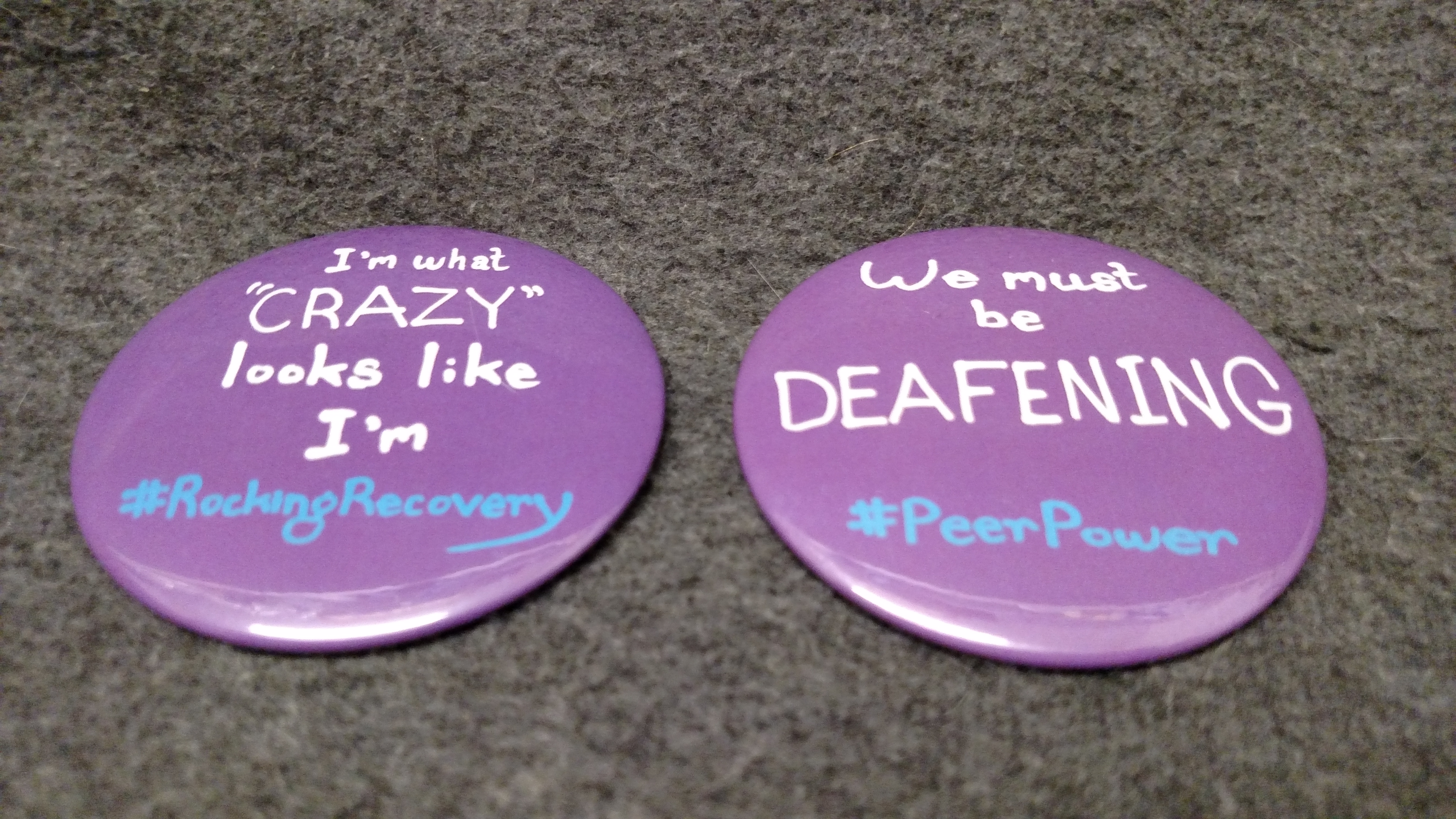
These t-shirts and buttons are still available for a limited time. If you are interested contact Ripple at www.rockingrecovery.com for more information, shirts will be $10 regardless of size, and the buttons are available for $1 each.
Page 4



